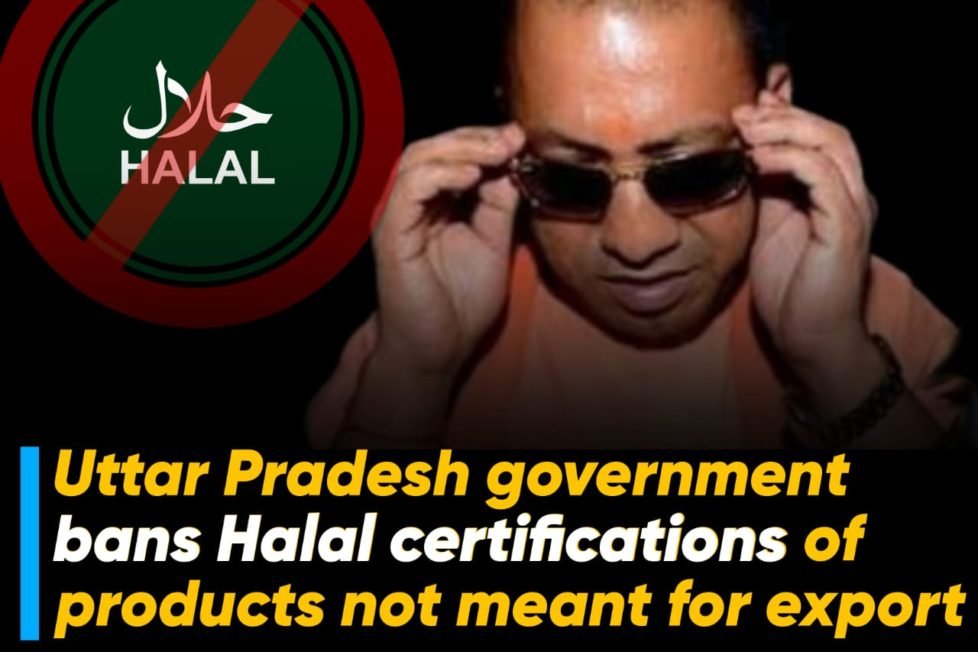Will Halal certification ban impact India?


The government of Uttar Pradesh put a ban on the production, storage, distribution and sale of food products carrying Halal certification. Additionally the government is going after all non governmental sources who have been issuing Halal certification in the state for many years. The ban encompasses stringent methods against any involvement with Halal certified products within. It is extended to restaurants and roadside food outlets too. Surprisingly, this certification was also used on medicines, medical equipment, medical devices, even cosmetics. Additionally, a large number of illegal slaughterhouses were operating in the state under the guise of Halal services. The stance of the UP government is, that this is not a religious issue, but a commercial one, as certain groups and people are benefitting from issuing this certification as well as running this specific businesses.
In relation to this step, FIRs were registered under section 120 b/ 153A/ 298/ 384 /420 /467/ 468 /471/ 505 in Hazratganj Kotwali of Lucknow, Halal India Private Limited Chennai, Jamiat Ulema Hind Halal Trust Delhi, Halal Council of India Mumbai, Jamiat Ulema Maharashtra, Mumbai etc. According to the FIRs, these outfits are running illegal business by providing Halal certificate on some products in the name of religion to the customers of a particular religion and taking financial benefits to increase their sales. These companies do not have any authority to give certification to any product. On behalf of these companies, fake certificates are being prepared and Halal certificates are being issued to various companies for financial gain. This not only increases social hatred but also betrays public trust.
Additionally, Section 89 of FSSA Act, 2006 gives overriding effect to this law over all other laws relating to food items. Therefore, this step by the Yogi government most certainly falls within the ambit of law.
The decision has come under a lot of criticism from the opposition parties who maintain that this is violating the rights of minority who can only consume Halal food, and that it will have a deep impact on their food habits, physical and mental health. We will look at why these arguments are all baseless later. First, we need to understand that pan India, the Halal certification business is worth more than 120,000 Crore per annum, as this is the amount collected in the name of yearly certification tax by the various certification boards. As far as other countries are concerned, this certification business generates 5 Trillion US dollars worldwide every year. This information was shared by Sri Harinder Sikka who is an authority on Halal businesses across the world. All the noises which are being raised against this decision of Yogi Adityanath are coming because this decision will hurt many groups very hard in financial terms.
The argument presented by the parties opposing ban on Halal certification revolve around rift in communities, division in society etc. Some were seen taking the ‘scientific’ reasons behind halal chicken and trying to sell the idea that in fact non Muslims could also benefit from eating Halal meet. All this time, none of them mentioned the fact that meat or chicken marked Halal is exempt from this ban, and it can still be displayed by retailers. The argument presented by Jameet ulema India is that Halal is all about ‘hygiene and purity’ falls flat on its face the minute we see that the Halal certification is being used on non-edible products like clothing items, cement, hair oil, soaps and shampoos.
Contrary to the claims of the anti Yogi brigade which is alleging that this ban will have a negative impact on those who only consume Halal products, this move has nothing to do with personal choices. If this was the case, the same would have applied to labelled chicken and mutton too. The fact of the matter is, this step is taken as Halal Certification bodies are non regulated and do not work under the control of government. This means that the government has no way to track where the large amounts of money is coming from and where it is going. This in itself is a threat to national security among other things.
India or a state in India is not the first in the world to impose this kind of restriction. In Poland as well as in Sri Lanka, there is a completely ban the sale or display of Halal products. Halal is not available for sale in Poland, whereas display of Halal sticker and its in-store advertising is banned in Sri Lanka. If the decision to ban Halal certification by UP government survives court challenges, the state will pioneer in India what should have been done many years ago, and that is, eradicate a parallel economy which presents multiple challenges to the country.
DISCLAIMER: The author is solely responsible for the views expressed in this article. The author carries the responsibility for citing and/or licensing of images utilized within the text.
